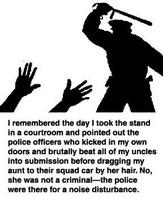Breaking Rank

The other day, I was listening to Air America. I think it was Ed Schultz. Anyway, he was discussing the New Orleans police beating up a 64 year old retired school teacher, Robert Davis.
The conversation got really really interesting when a retired cop called in. This guy claimed to be a 28 yr. veteran police officer. He related some personal experiences that really rang true. His thesis was that the problem is much more centered on the culture of American police departments as opposed to any particular set of circumstances. And according to the caller, abuse by officers is not rare. The caller suggested that through reading this book, Breaking Rank, and lots of therapy, he had a clear understanding of exactly why he had been so violent and had abused citizens.
I've not read the book, but plan to.
I also want to say that I have no information on women, thus the focus of this discussion is on male police officers. It would be very interesting to compare/contrast police techniques and statistics relating to women police officers vs. men.
It's always seemed to me that professions, such as being a policeman, are somewhat self-selecting. The people who choose these professions seem to have an some kind of "issue" with power. Meaning, a need for power, a fear of power, a sense of a lack of power, or a desire to exercise power. Of course, this self-selection can be a very good thing or a problem depending on the training available, culture of the department, and management. And yes, this is a very broad stereotype. But I make this claim based on personal clinical experience. It would be interesting to see research done on such an ancedotal claim.
Clearly police work by it's very nature has something to do with power. After all, the citizens grant greater power to these individuals to maintain law and order. And I'm not so naive as to believe that with some citizens, raw power becomes a necessity. So by it's nature, the profession is so much about power.
Beyond power, another element that comes into play is the social fabric of our country. There's little doubt that America is one of the most violent developed countries in the world with gun ownership, murder rates and violent crime rates. One of the most interesting factoids to come out of Michael Moore's movie, "Bowling for Columbine" was a comparison of Canadian and U.S. gun ownership patterns. Per capita gun ownership in Canada far surpasses the U.S., but the U.S. per capita murder rate by gun far surpasses Canada. Obviously just having a gun isn't the only factor in murder by gun. Throw in a little fear from our media (LIKE DON'T PUT YOU BABY ON IT'S STOMACH OR IT WILL DIE!!!!!), and you have a people who are afraid of their shadows, who shoot first and ask questions later...sometimes including police. Take, just as a minor example. An incident occurred here last week in Santa Rosa. Police officers shot a suspect 27 times. They shot at him 42 times. It appears the shooting was justified. But a tad overdone maybe?
Another element is the current political climate in the U.S. A subtle message is being sent from our leaders to law enforcement. That message is to be afraid, don't trust anyone, your-ass-is-grass if you make a mistake, and "the end justifies the means". We saw this in Abu Grahab whether soldiers were given direct orders to torture or not. I think we're certainly seeing it more on the streets in the U.S. as numerous stories emerge of police overreaction and abuse.
If you combine the profession, the players, and the American culture I think you get a very aggressive paramilitary approach to policing. In terms of a "carrot and stick" approach, American police seem to be much better/proficient/willing to use the stick part while being less so with the carrot approach. Mix in some steroids that up the ante, and watch out. Shoot (pun intended). The very fact that police might think they need steroids speaks volumes.
I don't think there are any easy answers. Certainly prosecuting those who abuse their power is important. But I think a larger change has to occur as well. Police departments need to increase training in power skills that don't use violence. Thus far, these types of conflict resolution skills get the reputation of being wimp skills among men, much less police officers. But I contend the "wimp" factor is more a reflection of the problem than the problem itself. Finally, as was suggested by the caller to Ed Schultz's show, it needs to become much more acceptable for officers to admit they are stressed and that they have made, or might make, a mistake. By making it easier to admit, it also becomes easier to address a problem before someone gets hurt.
I hope the much larger political culture will also change from one of such fear, to one of more confidence. The media plays a role as do those of us as consumers of the media. It's in this much larger framework that the above recommendations have a greater chance of success, and instances of the beating of Robert Davis in New Orleans are eliminated.
1 Comments:
I'm thinking the increase in violence and aggressiveness is across the spectrum in this country. Look how polarized we are politically. Look how aggressive corporations are becoming, how 'violent' and combative toward their workers they have become. Look at the aggressive, "circle the wagons" mentality of many in the religious community.
It's just easier to spot in something as blatant as a police beating.
Post a Comment
<< Home